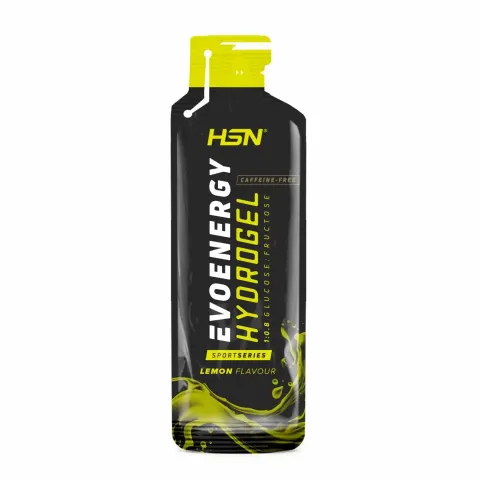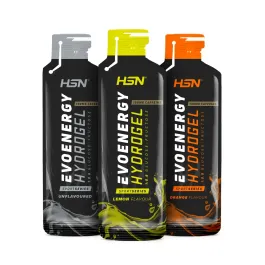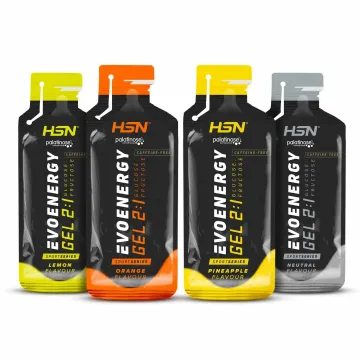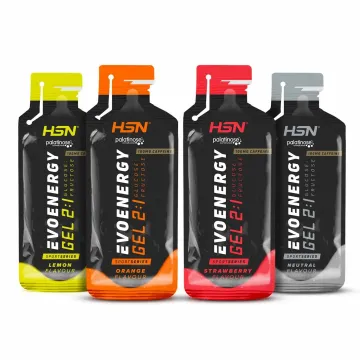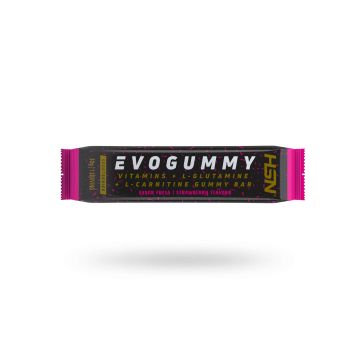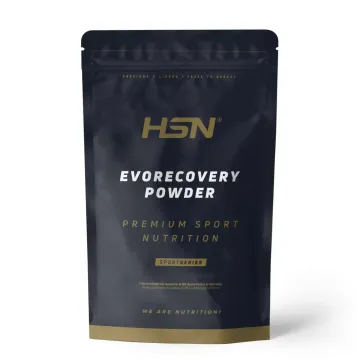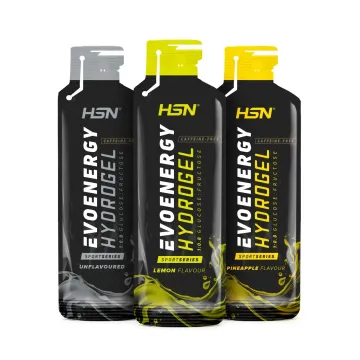- New Evoenergy Gel - Hydrogel Version - Discover HSN's lightest gels.
- Highly aqueous fluid consistency - Ideal for those who need gels that aren't heavy.
- Non-caffeinated version - 100% stimulant-free - Suitable for night-time training sessions.
- More moderate carbohydrate content - 30 grams per gel - Perfect in combination with isotonic drinks.
- Available in delicious and light flavours - Less intense than other gel versions.
- Easy to consume without needing water due to their much lower tonicity.
- Glucose : Fructose ratio 1:0.8 - Ideal for long-distance endurance athletes.
- Provides 120mg of sodium per gel to replenish losses of this electrolyte through sweat.
Evoenergy Hydrogel Without Caffeine - 'Hydro' Consistency, Discover It!
Evoenergy Hydrogel Without Caffeine from SportSeries is the first presentation of high aqueous consistency energy gels from HSN. They are low tonicity gels, with 40% carbohydrates in a 1 Glucose: 0.8 Fructose ratio with sodium chloride in their composition.
Hydrogels are presentations of gels with a much more fluid consistency than traditional gels, they are considered 'highly aqueous' gels because their use somewhat resembles using an isotonic solution with greater density; but this makes it the perfect complement to an isotonic drink during training, for people looking for lighter gels with less concentration than standard presentations.
Hydrogels are the perfect complement for moderate-demand routes, where instead of seeking large energy loads during the session, the athlete pursues a simple and convenient carbohydrate support.
Is Hydrogel a suitable option for me? Let us help you!
HSN Hydrogels vs Traditional Gels
Evoenergy Hydrogel and Evoenergy Gel (both in traditional and maxi versions) are options available at HSN as energy gels, which you can use according to your requirements, to meet your nutritional needs effectively.
HSN gels are always developed with appropriate carbohydrate ratios, according to the most significant and recent scientific evidence in sports nutrition.
However, the reasons for choosing one type of gel over another depend on the individual and personal preferences of the user, and these often come down to two considerations: flavour and 'concentration' preferences and the desired carbohydrate intake.
Evoenergy Hydrogel is a lighter version in these aspects than the traditional Evoenergy Gel presentations, both in its original and maxi versions (lighter than the traditional but not as light as the hydrogels).
This makes them the best option when looking for a less concentrated carbohydrate gel, because the event is not so energy-demanding, or because the user does not require much more intake than the Evotonic that all endurance athletes should consume as a base.
It is also ideal for people who have difficulties with using traditional gels, as explained below...
Highly aqueous texture - What does this mean?
'Highly aqueous' is the term that best defines the 'Hydro' texture.
Gels have a gel texture, and if you are used to traditional energy gels, you will know that the gel consistency is noticeable for better or worse; the 'worse' being that traditional gels often need to be consumed with water because their consistency is very dense, as is their tonicity.
Hydrogels solve this problem with a more fluid consistency, ideal for those who find traditional gels too heavy on digestion, or too dense or concentrated in carbohydrates.
The highly aqueous texture of Evoenergy Hydrogel is ideal for those who have trouble using traditional gels, either due to taste or digestibility issues.
1:0.8 Glucose and Fructose Ratio - Like our Evoenergy Maxigel
The monosaccharides in energy gels need specific ratios for maximum absorption, which is the goal of using this type of intra-training gel product.
According to scientific research conducted by the leading international groups, the ideal carbohydrate ratio can vary depending on factors such as the total amount of carbohydrates to be consumed during the event, primarily.
For significant carbohydrate intakes, especially when consuming around or over 90g of carbohydrates per hour, the best ratio according to Jeukedrup's findings, can be 1:0.8. This is the ratio we used for developing our gels.
Enjoy total and effective absorption with HSN hydrogels.
Lower carbohydrate content than other gels - Discover its positive side
Although the carbohydrate content in gels is highlighted, more is not always better, and our Evoenergy Hydrogel has a slightly lower carbohydrate content than other more concentrated carbohydrate and electrolyte gel presentations.
This is not negative, but rather opens the door for those who do not want or cannot consume gels with higher carbohydrate content, and is the ideal option for those looking for a balanced and light carbohydrate gel.
With a 40% concentration, it presents a clear difference from options like the traditional Evoenergy Gel, which has over 60% of its composition in carbohydrates.
Evoenergy Hydrogel is a lighter option, not only in density but also in nutritional content, ideal for casual athletes, those complementing with isotonic drinks, or athletes who know their preference and tolerance for traditional energy gel presentations used for intra-session energy replenishment.
If gels feel heavy - Evoenergy Hydrogel is your alternative
Many people find it difficult to consume traditional carbohydrate gels because their high tonicity causes heaviness and digestive discomfort.
While many other athletes do not experience this, for those who do, it creates a significant limitation in available options as energy sources during sessions, as they are limited to using isotonic drinks and consuming bars adapted for intra-session consumption (like Evogummy).
Evoenergy Hydrogel is the ideal alternative because its much lower density does not cause digestive discomfort even in those sensitive to the tonicity of the solutions they consume during training.
Caffeine-Free - When it’s better to use stimulant-free gels
Caffeine-free gel options are the 'way to go' for endurance athletes, with caffeinated options being more context-specific, for high physical or mental fatigue or use before psychological walls during sports events.
The benefit of caffeine-free hydrogels is that they can be taken at any time of the day. Even if you train late in the evening, you can take them without worrying about them interfering with your rest; and since they do not provide stimulants, they are an ideal option for those who use a pre-workout with stimulants and need to consume intra-training gels without accumulating caffeine doses.
Recommendations for incorporating them into your routine
The way to integrate gels always follows this criterion:
The recommended amount of carbohydrates to consume per hour of physical exercise varies between 60g and 120g, depending on the athlete's digestive adaptation, and factors such as intensity or the environment in which the sport will be practised.
Evoenergy Hydrogel provides 30g of carbohydrates, making it perfect for complementing the energy replenishment of athletes who consume between 60 and 90g per hour, along with their regular isot onic drink (like Evocarbs 2.0), they are ideal for providing a convenient and quick extra energy boost in a much lighter version.
Bibliographic references
- Naderi, A., Gobbi, N., Ali, A., Berjisian, E., Hamidvand, A., Forbes, S. C., … Saunders, B. (2023). Carbohydrates and Endurance Exercise: A Narrative Review of a Food First Approach. Nutrients, 15(6).
- Podlogar, T., & Wallis, G. A. (2022). New Horizons in Carbohydrate Research and Application for Endurance Athletes. Sports Medicine, 52(Suppl 1), 5–23.
- Patterson, S. D., & Gray, S. C. (2007). Carbohydrate-gel supplementation and endurance performance during intermittent high-intensity shuttle running. International Journal of Sport Nutrition and Exercise Metabolism, 17(5), 445–455.
- Saunders, M. J., Luden, N. D., & Herrick, J. E. (2007). Consumption of an oral carbohydrate-protein gel improves cycling endurance and prevents postexercise muscle damage. Journal of Strength and Conditioning Research, 21(3), 678–684.
- Kozlowski, K. F., Ferrentino-Depriest, A., & Cerny, F. (2021). Effects of Energy Gel Ingestion on Blood Glucose, Lactate, and Performance Measures During Prolonged Cycling. Journal of Strength and Conditioning Research, 35(11), 3111–3119.
- Phillips, S. M., Turner, A. P., Sanderson, M. F., Sproule, J., & Ward, S. A. (2012). Carbohydrate gel ingestion significantly improves the intermittent endurance capacity, but not sprint performance, of adolescent team games players during a simulated team games protocol. European Journal of Applied Physiology, 112(3), 1133–1141.
- Naderi, A., Gobbi, N., Ali, A., Berjisian, E., Hamidvand, A., Forbes, S. C., … Saunders, B. (2023). Carbohydrates and Endurance Exercise: A Narrative Review of a Food First Approach. Nutrients, 15(6).
- Vitale, K., & Getzin, A. (2019). Nutrition and supplement update for the endurance athlete: Review and recommendations. Nutrients, 11(6).
 Before
Before After
After During
During Morning
Morning Afternoon
Afternoon Night
Night Before
Before After
After During
During Morning
Morning Afternoon
Afternoon Night
Night Before
Before After
After During
During Morning
Morning Afternoon
Afternoon Night
Night







